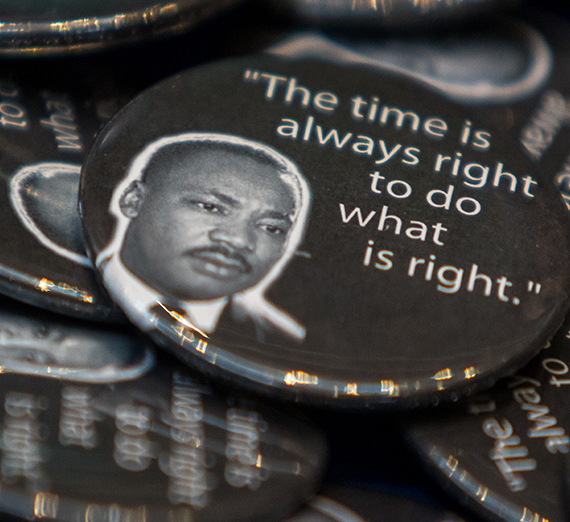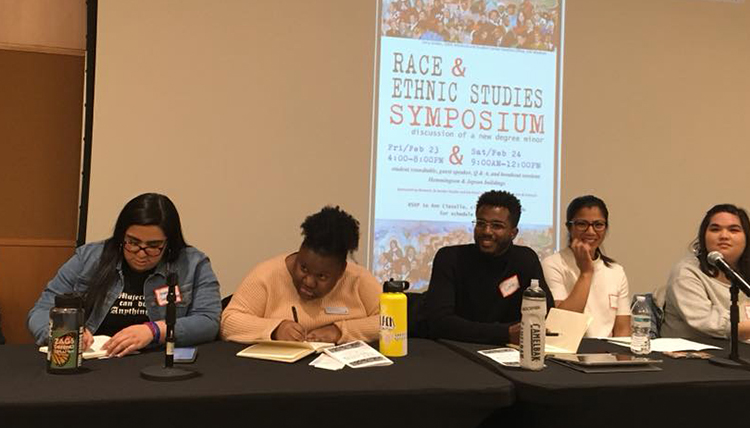An Education for Everyone

By: Kourtney Schott ’18
What: A new Race and Ethnic Studies Program
Where: Gonzaga University
When: (tentatively) Fall 2019
Why:
Though the conversation has existed for years, the idea of a race and ethnic studies minor emerged most prominently at the end of the 2016 spring semester. Former GSBA President Caleb Dawson, along with Amayrani Chavez, Trang Tran, Najhan Bell and Chip Mielke, propelled the need for an academic space that explored interdisciplinary focuses of race and ethnicity. As part of a larger group of activists, they researched programs at peer institutions and potential models for a minor and conducted a survey gauging student interest in the program, all of which they brought to Ann Ciasullo, Chair of Women’s and Gender Studies (WGST).
When asked if WGST would be willing to house the proposed race and ethnic studies minor, the department enthusiastically said yes, and plans for a new program were set in motion.
How:
Besides Ciasullo, the core development team includes Cynthia Stavrianos (Associate Professor of Political Science and incoming Chair of WGST), Sara Díaz (Assistant Professor of WGST) and Jessica Maucione (Associate Professor of English and WGST). All four women offer their expertise in different ways to help design a race and ethnic studies program – a process that requires time, commitment and a little imagination – all of which they passionately possess.
One of the most prominent events to contribute to the program’s development was the Race and Ethnic Studies Symposium, held in February. Born from a committee including the core program team, Noralis Rodriguez-Coss (WGST), Nicole Willms (Sociology), Ana Roncero-Bellido (English), Karen Petruska (Communication Studies) and Ricardo Elias Ortega (program manager, Unity Multicultural Education Center), the symposium aimed to make concrete movements toward what students, alumni, faculty, staff and administration wanted to see in the program.
The symposium itself mostly consisted of panels featuring both current students and alumni, keynote conversations and break-out small groups. With more than 100 participants from across the University over the course of two days, the symposium certainly demonstrated the positivity and support surrounding the program’s development. “One of the best parts of the symposium was seeing students and alumni who want a program that not only speaks to their experience but also makes Gonzaga a better place for everyone,” says Ciasullo. “It was very moving.”
One of the major points to come out of the symposium was realizing that race and ethnic studies could not appropriately exist as a minor within Women’s and Gender Studies; instead, it needed its own program with its own director. A race and ethnic studies program would exist very similarly to Gonzaga’s Native American studies program, yet the difference would be that a tenure-track hire in race and ethnic studies would have his or her home in the program, rather than in another discipline.
Before leaving the symposium, students urged the committee to take note – literally. Díaz pulled up a Word document, and collectively, the group developed a list of action items to ensure the energy that participants felt and shared that weekend remained vibrant even after leaving the room.
The core team will incorporate content-expert advice from visiting scholars, as well as the feedback from the symposium while creating a proposal to submit for review.
It’s possible the program could be up-and-running by fall 2019.
Creating a new program does not come without its challenges. Ciasullo, Díaz and Stavrianos voice the same major concern: continuing resources. “Programs require funding, which can be hard to find in an era in which higher education is facing budgetary challenges,” says Stavrianos.
Additionally, Gonzaga requires expert advice on how to form the curriculum. Though members of the core development team offer their interdisciplinary expertise, the university would greatly benefit from hiring a consulting scholar whose work is specific to the discipline of race and ethnic studies.
“For me, the short-term reward is seeing the community come together,” says Díaz. Beyond that, though, she, as well as Stavrianos and Ciasullo, know that the most impactful reward will be realized when students see Gonzaga as teaching a holistic curriculum, one that contributes to a more complete education – for everyone.
UPDATE:
In a Memo dated March 26, 2018, Interim Academic Vice-President Elisabeth Mermann-Jozwiak shared that she and President Thayne McCulloh support the faculty’s proposal and believe the efforts will be enhanced by a visiting scholar in Race and Ethnic Studies. A search for that candidate is already underway.

